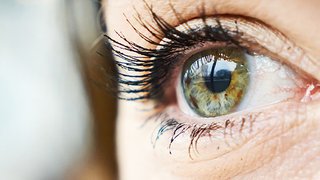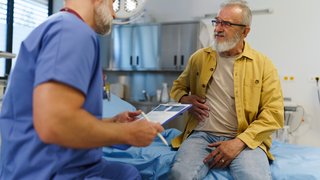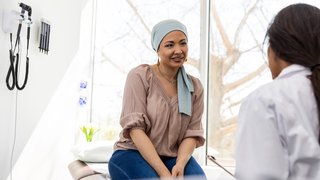
Certain foods can help reduce our cancer risk.
Our bodies are living, breathing machines. For optimal performance, we must fuel our bodies with healthy foods full of nutrients. There is no “miracle anti-cancer diet,” and there is no single superfood that will guarantee 100 percent cancer prevention.
That said, research has shown time and again that our lifestyle choices – including diet and nutrition – have a major effect on our overall health and cancer risk.
How eating better can help prevent cancer
Inflammation is your body’s natural defense against microbes, chemicals, and other elements that try to invade the body. Usually, inflammation goes away when the invading element is controlled. But chronic inflammation can result in some types of cancer.
Certain foods can contribute to chronic inflammation, which causes cellular damage and increases our cancer risk over time:
- Refined carbohydrates, such as white bread and pastries
- Fried foods, including French fries
- Sugar-sweetened drinks, such as soda
- Red and processed meats, including beef and lunch meat
- Alcohol, one of the biggest risk factors for cancer
These inflammation-causing foods have long been linked with other diseases, including Type 2 diabetes and heart disease. They also promote obesity, which researchers have tied to many different types of cancer.
But certain foods can help decrease inflammation in our bodies, which can reduce our cancer risk:
- Cold-water fish (salmon, tuna, and mackerel)
- Nuts and seeds
- Olive oil
- Green vegetables, such as broccoli, kale, and asparagus
- Fruits, including strawberries, blueberries, and oranges
Besides their anti-inflammatory properties, these foods also contain less unhealthy fat and more fiber and nutrients to support your immune system. By filling up on healthy foods, you’ll leave less room for unhealthy foods in your diet. A healthy diet helps you manage your weight, protect your heart, and reduce your overall cancer risk.
Fruits, vegetables, and seeds also contain antioxidants, which researchers think may affect cancer risk by neutralizing free radicals and preventing cellular damage. More research is needed to determine the full effect of antioxidants on cancer risk.
Research has shown that certain vitamins may be helpful in preventing some types of cancer, but there are other vitamins that can increase your risk. If you’re considering taking supplements for cancer prevention, talk with your physician to be sure your choice is safe for you.
Nutrition tips for a healthier you
Changing how you eat can seem intimidating, but it’s not as scary as it sounds. Healthy eating does not mean you’ll be stuck eating only carrot sticks and salads forever. It’s about finding a manageable balance and making healthy choices.
Use these tips to help you get started:
- Make one change at a time: Giving up all of your “comfort foods” at the same time can leave you feeling frustrated and hungry. Try reducing the amount of sweets you eat the first week, the amount of salty snacks the next week, and so forth. Replace these foods with a healthy fruit or vegetable option to keep you from feeling hungry.
- Don’t be too strict: The more we replace inflammation-causing foods in our diet with foods that decrease inflammation, the healthier we will be. But strive for a healthy balance – go ahead and enjoy a treat once in a while. Just be sure it’s ONE treat occasionally, not SEVERAL treats every night.
- Try something new: Maintaining a healthy diet is not about achieving perfection or cutting out an entire food group. It’s about choosing foods that properly fuel and support your body and foods that you enjoy preparing and eating.
Ultimately, the healthier our diets, the healthier our immune systems and our bodies. If you are diagnosed with cancer – which can happen even if you do everything right – following a good diet will help you stay as strong and healthy as possible during treatment and recovery.










